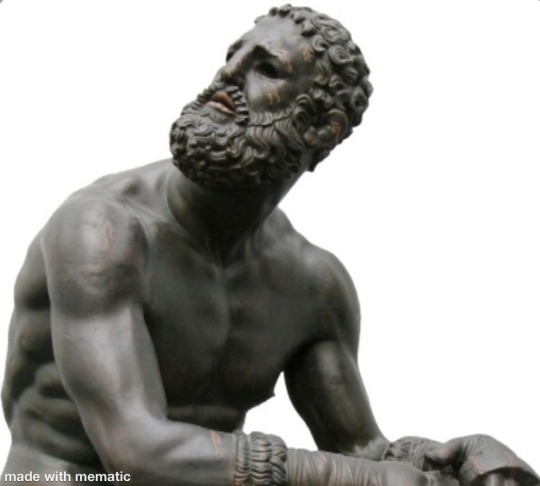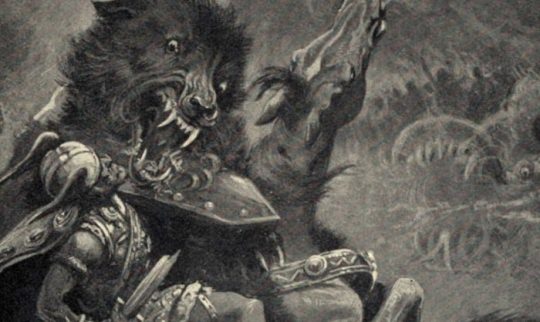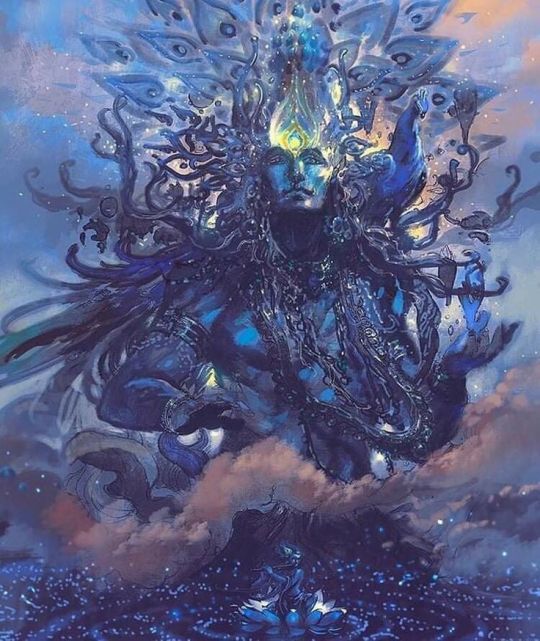Text
Mythology in Media: Dune
So, it’s no surprise that our media incorporates mythology a lot, right? I talked about it a bit before, and we can see it plainly in books like those written by Rick Riordan, as well as the “Rick Riordan Presents” books. But I always love seeing just how deeply ingrained ancient mythology is in our society. (Warning: This post will contain spoilers for the Dune Saga).
So, I’ve been rereading the Dune Saga, cause why not, right? And I really love seeing just how much inspiration Frank Herbert takes from multiple mythologies and religions. So, the name of Paul’s family, “Atreides”, is, of course, taken from Greek Mythology, specifically the myths of the Trojan War and Sparta from around that time, as the two brother Menelaus and Agamemnon, the sons of the king, Atreus, were called the Atreides (the “ides” ending in Ancient Greek actually means “descendant of”, and is used a lot in Greek Myths).
But more than that, you can see it in just the story itself. Paul Atreides can be likened to Apollo, with his presient abilities, similar to Apollo’s dominion over prophecy. Paul also played the baliset, a stringed instrument not unlike Apollo’s lyre, and moreover, he took it from Jamie, not unlike how Apollo supposedly had taken the lyre from young Hermes.
Similarities go beyond Paul, though. In Greek mythology, Artemis is supposedly born with full consciousness, and even aids her mother in birthing her brother, Apollo. Similarly, Alia Atreides, Paul’s sister, is a “pre-born”, someone born with all the ego-memories of her ancestors, and as such is conscious from birth. Alia is also called Alia of the Knife, and is considered a divine huntress of the faithless. Artemis is a goddess of the hunt and leader of the immortal Hunters of Artemis.
But the mythological and religious influences on Dune go beyond Greek mythology. Dune is heavily filled with references to Islam and Islamic culture and religion. Paul is revered as the Mahdi, the saviour of the Fremen in their messianic legends, and the Lisan al Gaib, or the “Voice from the Outer World”. Both of these words are actually taken directly from Arabic language, and moreover, they are similar to titles of messiah and prophets mentioned in Islamic texts.
Further, the Fremen people of Dune seem to be inspired by the indigenous tribes of North Africa and Middle East, with their culture and values and life style. In the appendix to Dune, “The Religion of Dune”, there are also references to ten ancient teachings, and at least half of them are clearly Islamic in nature.
The position of Emperor in the Imperium of Dune is called the “Padishah Emperor”, and Padishah is a term for ruler used in Turkish languages. Similarly, “ Sardaukar” is a Persian term for commander or prince.
The biggest thing in my view, though, is the use of the word “jihad”. It means a holy conquest in the name of Islam. Paul describes the religion of Muad’dib exclusively as a jihad, never a conquest or crusade.
I’m sure there are other similarities, but these were the ones I noticed in my rereading (I am only on book one though). Have a good day everyone!
#smythologies#mythology#islam#greek mythology#trojan war#atreides#agamemnon#menelaus#jihad#dune#frank herbert#mahdi#muad'dib#apollo#artemis#alia atreides#paul atreides#fremen#messiah#dune messiah
47 notes
·
View notes
Text
Similasis Episode 2

Hi guys! Sorry for not posting yesterday, here’s Similasis Episode 2.
Greco-Roman myths have a lot of similarities with many other cultures and mythologies, so I’m gonna continue with talking about them. For this post, I’ll be doing Greco-Roman and Christianity.
So the biggest similarity, in my view, is Herakles/Hercules and Jesus Christ. When you think about it, there are a great many similarities here, and in fact, it’s something that’s been commented on by many historians and authors in the past. For example, some translators of Ovid’s Metamorphoses mention how similar these two beings are in the footnotes of their books. Note that I will be using the Greek names, but I mean the Greco-Roman characters.
Both Jesus and Herakles were children of the supreme, omniscient God in their mythologies (for Zeus was shown to be omniscient and omnipotent many times). Both were also marked for death from infancy; Herakles was hated by Hera as he was a sign of Zeus’ unfaithfulness, so she had sent serpents to kill him in his youth. Jesus was similarly marked for death, as a prophecy claimed that a new king would be born in Bethlehem, so King Herod, thinking the prophecy meant his reign would end, declared newborn infants to be killed, hoping that would counter the prophecy. They both, of course, survived these attempts on their lives.
In their later lives, both Jesus and Herakles performed miraculous and super-human feats; Jesus traveled the land, performing miracles and casting out demons, while Herakles slaughtered monsters and helped heroes with their own quests through his 12 labours. Thus, they both also made the world a safer place.
The most interesting part, though, is their death. They were both betrayed by ones they loved (Jesus by his follower, Judas, and Herakles by his second wife, Deianira). In their deaths, they both also lamented that their divine fathers had forsaken them in their most crucial moment. Finally, in their death, they both ascended from humanity to godhood.
This is really my favourite similarity, especially because of how famous Herakles and Jesus really are in the Western world. But, of course, there are far more similarities between Christianity and Greco-Roman myth.
The creation of the world is also rather similar; the most popular creation for Greco-Roman myth is Hesiod’s Theogony, in which Gaia erupts from Kaos, or nothingness. In Christianity, it’s said that God created the world from nothhingness.
There are also similarities between Pandora and Eve, how they both “caused” disaster to befall humanity and became scapegoats for Godly retribution. There’s also the fact of the Flood, which is, again, Godly retribution in both Christianity and Greco-Roman myth for humanity’s sins.
Those are the main ones I can think of, unfortunately. I’m sure there are others, though. Anyways, have a good day guys!
#smythologies#similasis#greek gods#greek pantheon#greek mythology#heracles#pandora#eve#roman mythology#olympian gods#mythology#jesus christ#christian faith#hesiod#theogony
3 notes
·
View notes
Text

Thank you @quoteofravennevermore and everyone who got me to 10 reblogs!
1 note
·
View note
Text
Bro What The Actual Fuck Ep 1

Ok I'm gonna start another mini series about how fucked up myths are! I'm calling it
Bro what the actual fuck
As a warning, this series will contain some triggering material, as mythology is, unfortunately, really fucked up. I'll try my best to preface any specific triggering portions beforehand, by saying (TW: [trigger]), and then following it by the triggering content in these brackets: {}, but I just want to make this clear from the start
So I'll start the series off with the one everyone knows: Greco-Roman mythology. Always nice to do a classic, right?
So where do I begin?
How about Zagreus, who was the (TW: SA, !nc3st) {r@p3 child of Persephone and Zeus}, though in some versions its Hades and Persephone.
Yes, Zeus made the beast with two backs with (TW: !nc3st) {his dear daughter, Persephone}, and had a young child, Zagreus. Unfortunately Zagreus was later killed, sliced up by daddy Kronos, if memory serves correctly, though it may have been other Titans instead. Gods can’t die, though, so his spirit remains, and eventually he’s reborn as Dionysus, the son of Semele and Zeus. Fun fact, this is why, in earlier myths, Dionysus isn't considered a demigod from birth, but instead more of a Earth-born God, because he's the "reincarnation", so to speak, of Zagreus.
Speaking of Persephone, girlie has had a pretty fucked up life. She was (TW: SA) {r@p3d by her own father}, and was then possibly (TW: kidnapping) {abducted by her uncle Hades with Zeus’ help}, though some versions said she happened on the Underworld by accident, or went willingly with Hades. She was then maybe force-fed 3 pomegranate seeds, though some versions say she ate them on purpose, having fallen in love with Hades, while others say she ate them by accident, resulting in her having to spend 3 months. This is actually how we have the seasons; fall is the three months when Demeter is dreading Persephone leaving her, winter is the three months in which Persephone has left Demeter, and spring and summer are the total six months when Persephone has returned from the Underworld.
There are also a lot of other fucked up stuff, most of it done by Zeus (TW: SA) {r@p!ng random women in weird ways}. He turned into a bull for Europa (thus fathering three sons, including Minos of Crete), he turned into a swan for Leda (thus fathering many children, including Helen of Troy and Castor and Polydeuces), he turned into a motherfucking golden raincloud for Danaë (thus fathering Perseus). He also changed himself to look like random men to sleep with their wives, for example, he turned into Amphitryon, Alcmene's husband, and fathered Herakles with her. Zeus also did the nasty with a lot of Titans and nymphs, thus fathering a lot of gods and goddesses. Honestly, it’s become a TikTok trend to say this, but Zeus really was a fucking manwhore. Of course, there are possible social reasons for this, but that’s a different topic.
Greek mythology gets far, far worse, too. The Minotaur was born when Poeidon sent a majestic white bull to Crete for Minos to sacrifice, but Minos thought it was too beautiful to kill, so he sacrificed a different bull (rookie mistake dude). Poseidon got pissed, so he enchanted Minos’ wife, Pasiphae, to fall in love with the bull, and she convinced the royal inventor, Daedalus, to make her a bull-suit to seduce the bull and get busay with it. Then the Minotaur was born and locked in a labyrinth, courtesy of Daedalus.
Then there’s also Pelops and Hippodamia. When Persephone was abducted, Demeter became (TW: mental illnesses) {depressed and distraught}, and she was invited by Tantalus to a dinner. Tantalus, wanting to test the omniscience of the gods, (TW: cannibalism) {murdered and cut up his son Pelops, and sered him to the gods}. Most of the gods realized what was happening, except for poor Demeter, who accidentally (TW: cannibalism) {ate Pelops’ shoulder}. The gods eventually revived Pelops, and Hephaestus made him a new shoulder. Pelops then went out to find a wife, and came across Hippodamia. The fucked up part here is that Hippodamia’s father, Oenomaus, was (TW: !nc3st) {in love with his daughter}, and so he challenged all potential suitors to run away from the old king with Hippodamia while he chased them on his magical chariot, saying that he’d kill the suitors if he caught them, Pelops had his own magical chariot, but he also bribed Oenomaus’ charioteer to allow him to (TW: SA, kinda) {have sex with Hippodamia} if Pelops won. Of course, Pelops managed to beat and kill Oenomaus in the end, and then also killed the charioteer (how sweet of him), so I guess that’s nice?
Of course there’s WAYYY more, but I think this is a good enough place to stop for now. Sorry for this long ass post, and I hope this wasn’t too fucked up for you guys! Have a great day!
#smythologies#greek gods#greek pantheon#greek mythology#these greeks were wild#zeus#zeus greek mythology#zeus god#zeus is a manwhore#zeus is a dick#persephone#poor persephone#hades#hades and persephone#what the fuck hades#mythology#man i don't wanna do this no more#greek mythology is weird#why is zeus so horny???#poor demeter :(#why are the gods such dicks
9 notes
·
View notes
Text

Thank you @fountain-ring and everyone who got me to 5 reblogs!
0 notes
Text
Adaptability of Mythology

When I took my first dedicated mythology class, my professor would talk a great deal about the “adaptability” of mythological practices and cultures, and how they grew and changed over time. At first, I didn’t really know what he was saying or really believed him, but then I started looking deeper and realized the truth behind what he said.
Take our media. Our books, movies, video games, etc., that are based in mythology. They’re filled with the romanticism and mystique of superheroes and caped crusaders. You can see it in their actions, in their mannerisms, in their personalities and backstories and, most of all, their powers. It’s not immediately visible, but once you see it, it’s hard to unsee.
For example, take the Rick Riordan books. In Greco-Roman or Nordic myth, demigods never really had special powers. In fact, most demigods in Nordic myth didn’t really have any powers, while in Greco-Roman myths, the powers of demigods and heroes tended to just be superhuman characteristics like speed, strength, intellect, etc., and almost never really relating to the domain of the demigod’s divine parents. Of course, in both Greco-Roman and Nordic myths there were exceptions, but the general case was as I described above.
But in Rick Riordan’s books, as well as other media, they all have powers based off the domain of the divine parent. When you consider superheroes, doing this actually makes a lot of sense. See, arguably, the biggest part of superheroes are their powers and mystique, and more specifically, the “genetic” component of that. Powers and mystique are passed down through generations, like Superman and his sons, or Batman and his Robins. The same thing happens with these books and media based of mythology, in which the powers and mystique of the specific gods are being passed down to their children in this way, giving them specific powers based off their divine ancestor.
You may wonder why superheroes, but I feel the answer becomes apparent when you look at the history of the West. After WWI, superheroes became incredibly popular. They were used a lot during the Great Depression, they were used as a recruitment tactic by the US and Allied Forces during WWII, they were used after WWII as a method to show just how amazing capitalist countries were, etc.
Even in more modern times, superheroes have still played a big role, despite people who read comics being called “nerds” and ridiculed for a good 20+ years, from the 80s onwards. They’ve just become a huge part of our culture, no matter what anyone says, for better or for worse. Hell, even kids who have never once picked up a comic-book obsess over superheroes like Batman, Superman, Spider-Man, etc. Thus, I don’t think it’s any coincidence that we choose to reshape mythology in this way.
Sorry for the long-winded and maybe difficult to understand rant, just thought it’s really interesting. Have a great day y’all!
#mythology#greek gods#greek pantheon#greek mythology#hinduism#hindu mythology#norse mythology#norse gods#norse deities#demigod#demigods#smythologies#rants#rants n rambles#superhero#superheroes#superpower#super powers#comics#theory#thoughts
39 notes
·
View notes
Text
Norse Mythology Vanished

You know what's sad? How little we know about Norse Mythology. Like, there are so many gods and goddesses and heroes and stories that used to exist, that just... don't anymore. Some scholars compare our knowledge of Norse Mythology now to if our entire knowledge of Greek Mythology consisted only of Herculean and Thesean myths. Of course, that's not exactly accurate; it's based off all the references in ancient texts to stories we can no longer find, as well as certain stories like Beowulf, which was likely originally about a Son of Thor but was altered by Christianity, but it's still pretty sad to think about.
Like, by all likelihood, there was probably a huge epic, on par with the Titanomachy in Greek Mythology, or the war over Amrit between Asuras and Devas Hindu Mythology, between the Aesir and Vanir in Norse Mythology, but now... it's gone. Lost in time. Same with so many different gods and goddesses. I mean, we really only know of like, 3 Vanir, but there were definitely wayyy more.
The reasoning for this is also pretty annoying; in the 11th century, the Church began moving to Iceland, and once Christianity had settled over Iceland, they began recording and archiving Norse myths. However, they also began throwing out a lot of it; whatever the Church thought was dangerous or unneeded was either burnt and discarded, or altered heavily to be more Christian.
Idk man, it's just so annoying for me
Anyways have a great day yall.
#norse mythology#aesir#vanir#odin deity#thor#loki#smythologies#rants#smy speaks#mythology#nerd stuff#nerdy girls#norse heathen#norse gods#norse deities#greek mythology#greek pantheon#titanomachy#freyr#beowulf#aesir vanir war update when?
168 notes
·
View notes
Text
Gaia wtf?

In Hesiod's Theogony, Gaia had given birth to Ouranos. And then Ouranos and Gaia had children together. What the fuck man.
#mythology#greek mythology#greek pantheon#greek gods#mother gaia#gaia#ouranos#uranus#gaia what the fuck#incest ig#these greeks were wild#rants#smythologies#4 am rambles#literally sobbing#what the fuck#i dont wanna do this anymore#mommy milkers too good?#im sorry kronos#the side percy jackson never shows you#giving milf a whole new meaning#hesiod#theogony#grimdark
4 notes
·
View notes
Text
Similasis Ep 1

You knows just wild? How similar different mythologies and religions are to each other. That's why I'm gonna be doing this series, called:
Similasis
Or "Similologies" if you want.
But yeah, I'm just gonna be talking about different mythologies and their interesting similarities. Some may seem like stretches at first, but I feel like that's just part of the fun!
This first, "pilot episode" will be about:
Hinduism and Greek Mythology
So, let's start off with Krishna (Hinduism) and Herakles (Greek Mythology).
They're both "descended", in a sense, from one of the ultimate divinities in their respective pantheons; Krishna is the "avatar" of Vishnu, the Sustainer, while Herakles is one of Zeus' most popular children. They're also both incredibly powerful, with Krishna basically being a God on Earth, and Heraes having incredible strength.
From birth, they were also hunted and hated by a family member; for Krishna, it was his uncle Kansa, because of a Prophecy saying that Kansa would die at the hands of his sister's eight child. For Herakles, he was hunted by his stepmother, Hera, in her attempts to retaliate against Zeus for cheating.
As such, both faced, and defeated, assassination attempts at a young age. The she-demon Putana, sent by Kansa, attempted to breastfeed Krishna with her poisoned milk, but the young Godling bit down hard and simply sucked her dry (power move fr). On the other hand, Hera sent snakes to kill Herakles, which the child strangled with ease.
This isn't shown much in modernity, but both Krishna and Herakles were well-known for their wit and cunning; Krishna would always use his intellect to trick and confuse his adoptive mother Yashoda Ma, while Herakles has used incredible punishment to escape punishment and retribution in the past.
They've both also shown incredible feats of strength. When Vrindavan was being flooded by Indra Dev, Krishna lifted the Mount Govardhan with his little finger, so it acted like an umbrella. Similarly, while completing his Twelve Labours, Herakles held the sky on his back to allow Atlas to get him some apples.
Another major similarly is how similar the Mahabharata (Hinduism) and Trojan War (Greek Mythology) are. Many of the prominent characters share similar aspects, for example Arjuna (Mahabharata) is quite similar to Archilles (Trojan War), as they both refuse to fight (for admittedly different reasons), but eventually, due to a personal loss (Arjuna's son Abhimanyu, Achilles' lover-friend Patroclus), they both join the fray. Both Krishna and Achilles, two of the strongest beings in their wars, are also killed by an arrow to the heel. Achilles is also quite similar to Duryodhan, as they both were given blessings from their mothers (special armour for Achilles, stone body for Duryodhan) that were supposed to protect them from harm, but still didn't fully save them, due to a fatal weak point.
Of course, there are lots of other similarities between them, but for now, I think this is more than enough. Have a great day!
- Smylee
Edit: I almost forgot, both Achilles and Arjuna crossed dressed before. OK now I'm done.
#mythology#nerd alert#nerd stuff#hinduism#greek gods#greek pantheon#greek mythology#hindudharma#hindu mythology#mahabharata#trojan war#trojan horse#the illiad#achilles heel#patroclus#krishna#heracles#vrindavan#krishna vrinda vihari#arjuna#percy jackson who?#arjun is daddy#achilles was a twink#twelve labours these balls#analysis#similogies#similasis#smythologies#hindu myth memes#hindu
18 notes
·
View notes